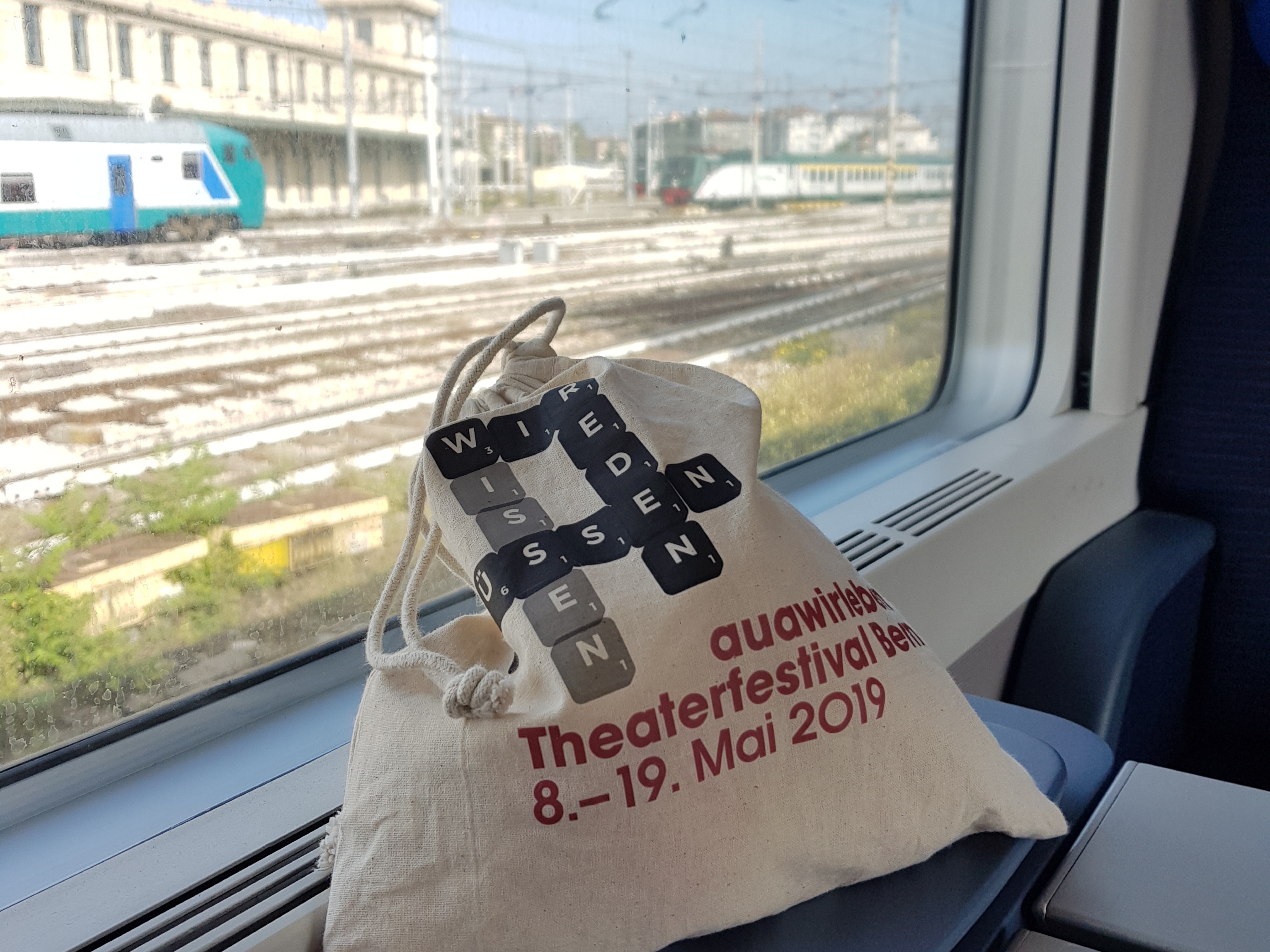Sustainability
CO2 balance auawirleben
At the beginning of 2022, we had the company Carbotech draw up an eco-balance of auawirleben. As the previous financial years were not representative due to the pandemic, an exemplary balance was drawn up using figures from previous years instead of an effective operating balance for a single financial year. For the eco-balance, primarily the CO2 impact of the individual business areas were considered (henceforth CO2 balance).
At the beginning, we were given the task by Carbotech to create the value chain of the festival.* We recorded the operational process from the scouting of a potential guest performance, through the festival organization, advertising, set-up, the event itself, to dismantling and the administrative closing. This task helped us to recognise the system boundaries, i.e., to see what we ourselves can influence and which aspects depend on others (e.g., venues, theatre groups, suppliers). We then collected as many figures as possible for the identified areas (kilometres travelled, types and quantities of materials, quantities of catering, etc.). From this, Carbotech calculated a CO2 balance for us with in the fields of energy, materials, food, transport, mobility of the artists, mobility of the audience, mobility for scouting, waste disposal and accommodation (artists and scouting trips).
The company balance sheet did not bring any unexpected insights to light, but it did give us more clarity on many points. It was extremely useful for us to become aware of the system boundaries in order to determine exactly where our scope for action lies. This is the only way we can optimise our processes in the future and not lose too much energy and time on things that are outside our scope of action, such as low energy consumption in the venues we rent for performances.
Likewise, it was important to see which parts of our value chain really matter in terms of ecology and where creating sustainable processes serves more as awareness-raising measures. For example, food, which includes backstage catering and the public festival restaurants and bars, accounts for a rather small proportion of the CO2 emissions of our festival.
Travel, on the other hand, accounts for a large share. However, our own scouting journeys are not very significant, as we have set ourselves the target in our manifesto to travel distances of less than 11 hours by train or bus. The Carbotech evaluation confirmed once again that every single flight that can be saved makes a big difference. And that's why we will be even more committed to clarifying in future whether the artists and crews can also travel by train. Many people are already doing this, but we can certainly achieve more here if we are even more consistent in not always choosing the cheaper and supposedly more convenient option.
Apart from the relations between the individual operational areas, it was important for us to get an impression of how much CO2 the festival emits per festival visit. If we divide the calculated total of 34,000 kg of CO2 by 3,500 festival visitors, it means that 10 kg of CO2 were consumed per visit. This corresponds to a car journey from Bern Breitenrain to Lyssach and back. We think theatre is worth that!
We would like to thank Philipp Bolt and Gerrit Vorhoff of Carbotech for their valuable and generous support in our process towards a more sustainable festival.
* A value chain describes all the interrelated activities and processes of a company that are necessary to produce a product - in our case, the festival.
Sustainability at auawirleben
Environmental sustainability is very close to our hearts. And we find that the cultural and event industry still has room to improve when it comes to environmental sustainability. That's why we are looking for practices and solutions that are as sustainable as possible, both in our day-to-day office life and in during the festival.
In the aua office, we make sure that we keep our electricity consumption as low as possible and that we don't buy equipment that we can borrow or share elsewhere. We print our letters and advertising material on recycled paper with labels FSC and Blauer Engel. During the festival, we do not use disposable cutlery or plates nor individual packaging for backstage catering, at the festival bars or in the kitchen. Instead, we use reusable glass bottles, jars, etc. for our artists' catering. When buying food, we make sure that it is produced as locally, organically and fairly as possible. Our drinks and food menu at the Festival Centre was vegan for the first time in 2022.
But we also want to set a good example in our programming. For scouting trips, we travel by train or bus for distances under 11 hours travel time. We ask the guest artists to travel by train, bus or together with the material transport for distances of less than 9 hours. Air travel is an exception.

Because we are convinced that the best way to make progress on the topic of ecological sustainability is to work together, auawirleben is part of Vert le Futur. Founded in 2020, this association promotes a sustainable culture and events industry. Vert le Futur is an interdisciplinary network of players with different backgrounds and from various fields, from theatre to music and circus to environmental science. They exchange knowledge and develop concrete approaches to make the event and cultural sector greener and thus more sustainable. Various events are in the pipeline, of which auawirleben will also be a host.


